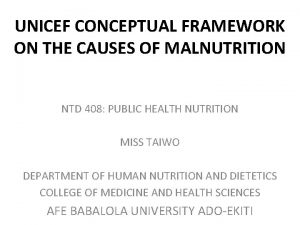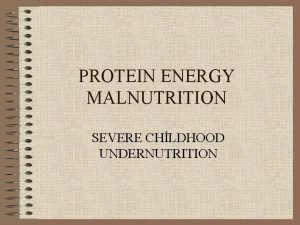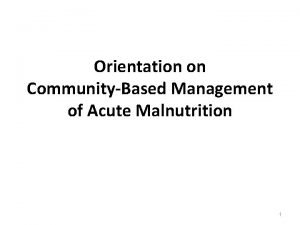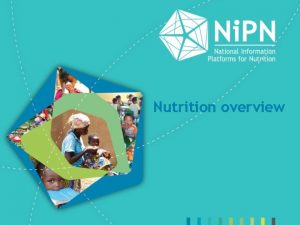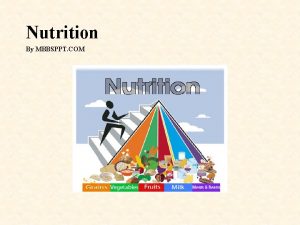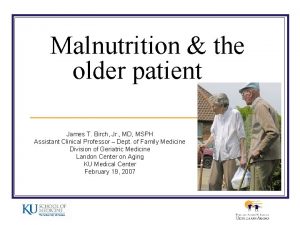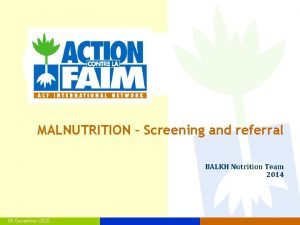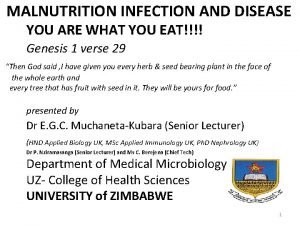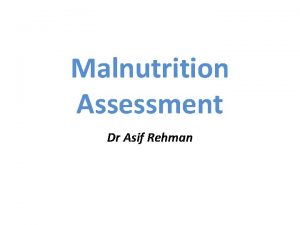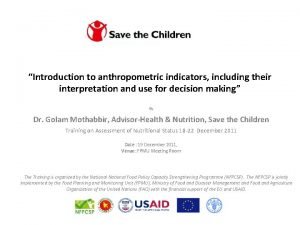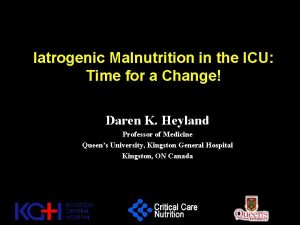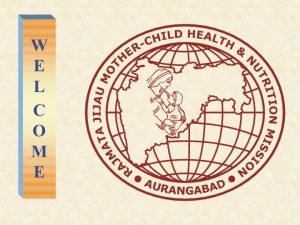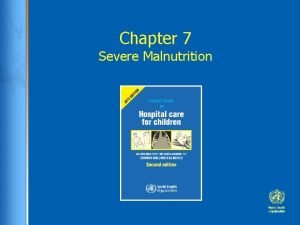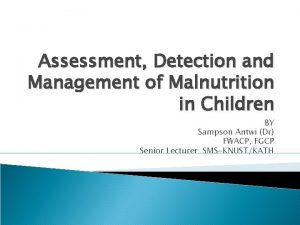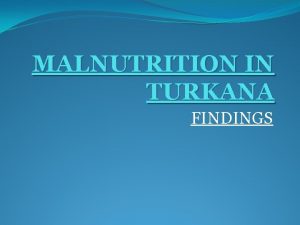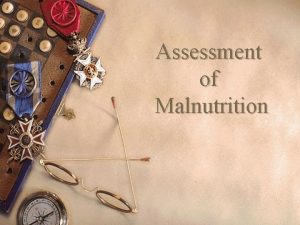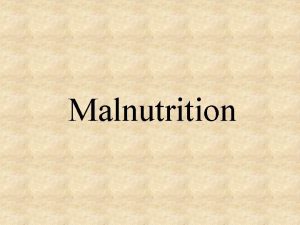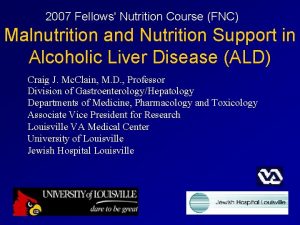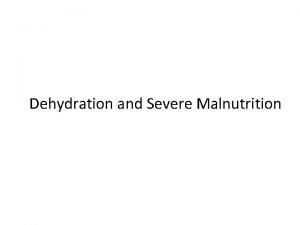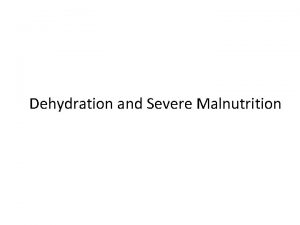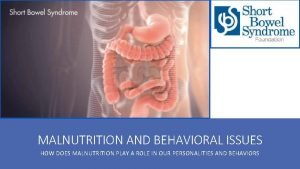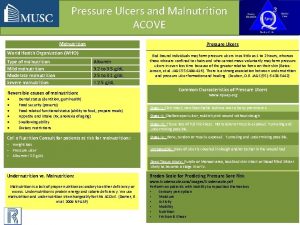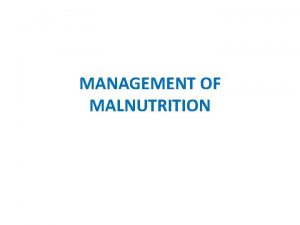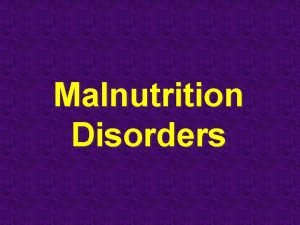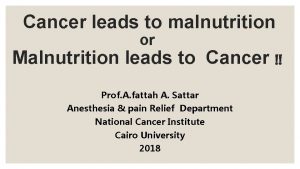Nutrition and Infection Malnutrition and infection Malnutrition can

















- Slides: 17

Nutrition and Infection

Malnutrition and infection • Malnutrition can make a person more susceptible to infection, and infection also contributes to malnutrition, which causes a vicious cycle. • An inadequate dietary intake leads to weight loss, lowered immunity, invasion by pathogens, and impaired growth and development in children. • A sick person's nutrition is further aggravated by diarrhea, malabsorption, loss of appetite, diversion of nutrients for the immune response, all of which lead to nutrient losses and further damage to defense mechanisms. • These, in turn, cause reduced dietary intake. • In addition, fever increases both energy and micronutrient requirements

Malnutrition and Infection • Undernutrition − Result of undernourishment, poor absorption and/or poor biological use of nutrients consumed • Undernutrition Leads to Deficiencies in : 1. Protein − Deficit in amino acids needed for cell structure, metabolic function 2. Energy − Calories (joules) derived mostly from macronutrients a. Protein b. Carbohydrate c. Fat 3. Micronutrients − For example, vitamins A, D, E and K; B-complex (thiamin [B 1], riboflavin [B 2], niacin (B 3), folate (B 9), pyridoxine [B 6], cobalamin [B 12]), vitamin C; iron, zinc, iodine, calcium, others

• Undernutrition can be milder, “hidden, ” affecting: • Survival • Development • Behavior • quality of life • economic potential


Causes of Childhood Undernutrition • Maternal undernutrition leading to intrauterine growth retardation (IUGR; small size at birth) • Chronic low energy and protein intake • Unclean/non-nutritious, complementary foods of low energy and micronutrient density • Too early displacement of breast • Dilution of formula • Exclusive breast feeding for too long • Infection (e. g. , measles, diarrhea, others) • Xenobiotics- chemical compounds foreign to a given biological system e. g aflatoxins

Malnutrition-infection interactions

Effects of Infection on Nutritional Status • Protein catabolism and negative nitrogen balance • Altered priorities for protein anabolism • Depletion of CHO stores • Increased gluconeogenesis • Altered lipid metabolism • Trace element (Fe, Cu, Zn) redistribution • Increased vitamin utilization and excretion

Major causes of death among children


• Micronutrient Deficiencies: Hidden Hunger • About 2 billion people affected • Major deficiencies Iodine, vitamin A, iron, and zinc • Effects Poor growth, increased morbidity, impaired intellect, increased mortality • Preventable Supplements, fortification, diet change

• Micronutrient Deficiencies and Infection • Vitamin A deficiency Increases risk of severe diarrhea, malaria, measles severity; child mortality • Zinc deficiency Increases risk of diarrhea, malaria; (likely child mortality) • Other micronutrient deficiencies Adverse effects on host defenses are likely

• Zinc Deficiency • Vast problem! • Highly prevalent in cultures with Low meat and fish (low zinc) intakes • High grain (high phytate) intakes • Zinc is a trace mineral that is essential for all species and is required for the activities of >300 enzymes, carbohydrate and energy metabolism, protein synthesis and degradation, nucleic acid production, and carbon dioxide transport. • It is a cofactor in the formation of enzymes and nucleic acids and plays a critical role in the structure of cell membranes and in the function of immune cells. • Zinc deficiency reduces immunity, and suppresses antibody production.

• Inadequate zinc supply prevents normal release of vitamin A from the liver; • Clinically, it is associated with growth retardation, malabsorption syndromes, fetal loss, neonatal death, and congenital abnormalities. • Low blood zinc concentrations have also been found in patients with tuberculosis, diarrheal disease, and pneumonia. • Zinc deficiency is associated with abnormal pregnancy outcomes and conditions of relative immunocompromise, kidney disease, burns, inflammatory bowel disease, and HIV infection.

• Zinc supplementation reduces the duration and intensity of diarrheal illness and pneumonia among children living in developing nations. • It limits growth stunting in children affected by acute diarrheal illness In patients with sickle cell disease, it decreases the number of infections and hospitalizations. • A weekly dose of 70 mg not only reduced the incidence of and prevented death of pneumonia but also had an effect on the incidence of diarrhea, with overall mortality reduced by 85%. • Resistance to infection and improved appetite were found with continuous potassium and magnesium as well as zinc supplementation

More than 1. 5 million children die of acute diarrhea each year Case fatality can be reduced with ORS, fluids in the home, breast feeding, continued feeding, selective use of antibiotics and zinc supplementation for 10– 14 days Provide 20 mg per day of zinc Available in 20 mg dispersible tablets as zinc sulfate

Zinc Supplementation • Reduces diarrhea, pneumonia, and possibly malaria incidence • Reduces diarrhea duration and severity • Preliminary—may reduce child death
 Maternal and child malnutrition
Maternal and child malnutrition Conceptual framework on the causes of malnutrition
Conceptual framework on the causes of malnutrition Gomez classification
Gomez classification Protein-energy malnutrition definition
Protein-energy malnutrition definition Moderate acute malnutrition
Moderate acute malnutrition Objectives for malnutrition
Objectives for malnutrition Formula holliday segar
Formula holliday segar Malnutrition definition
Malnutrition definition Marasmus
Marasmus Conclusion about malnutrition
Conclusion about malnutrition Malnutrition definition
Malnutrition definition Anthropometric measurements ppt
Anthropometric measurements ppt Kode icd 10 hipotiroid
Kode icd 10 hipotiroid Iatrogenic malnutrition
Iatrogenic malnutrition Orbital fat pads malnutrition
Orbital fat pads malnutrition Malnutrition conceptual framework
Malnutrition conceptual framework Severe acute malnutrition case presentation
Severe acute malnutrition case presentation Baggy pants malnutrition
Baggy pants malnutrition

